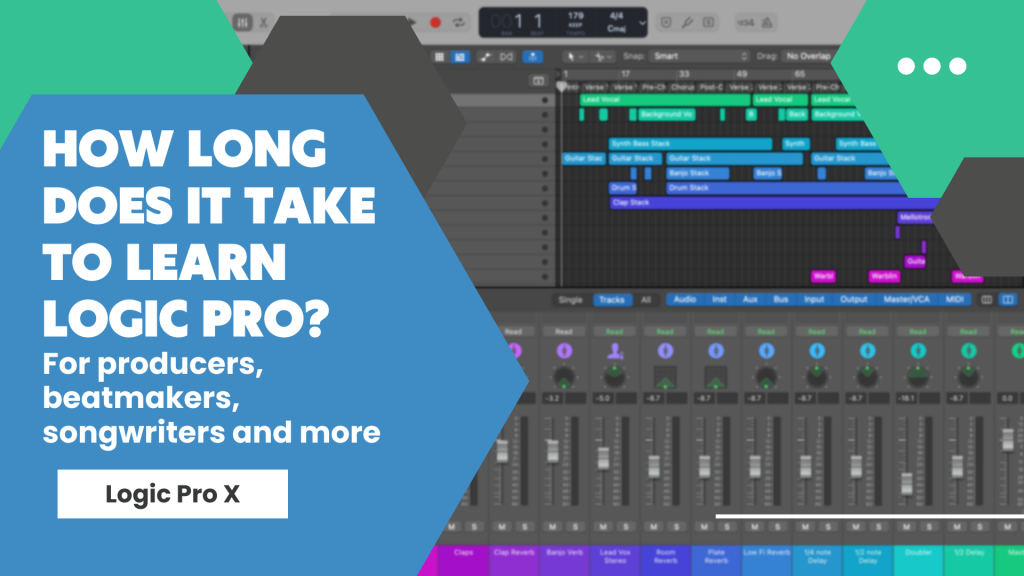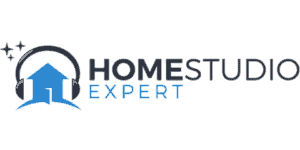If you’re a first-time DAW (Digital Audio Workstation) user, or looking to upgrade your current software setup, Logic Pro is an excellent choice to fulfill a huge variety of audio-based tasks from recording to beatmaking to mixing and mastering.
But how long does it take to actually learn Logic Pro? For an average first-time user, you could expect to be up and running, ready to make your first track in just 1-2 weeks (about 10 hours of work) and fully familiar with the main aspects of Logic in about 2-6 months.
In this article, I’ll be going through how easy Logic Pro is to learn for different types of users, how long it will take you to learn, some of the best strategies for learning, and finally we’ll also look at some DAWs which might be a better alternative.

Is Logic Pro Easy to Learn?
Opening Logic Pro for the first time can be very intimidating, especially if you’re unfamiliar with audio workstations. There are many buttons and screens, plus countless key commands which do all sorts of things.
In terms of how many features there are to learn, Logic Pro is not easy to use.
However, as you become more familiar with it you’ll realize that the interface is actually very intuitive. Things are laid out in a structure which makes sense and is easy to navigate. You’ll quickly discover which features are your favorite and which you’ll use on a regular basis.
There’s no need to learn every single function Logic has (unless you want to, of course) in order to make some really awesome music. Focusing only on what you need and becoming really familiar with it means using Logic Pro will be a breeze.
Let’s look at some common types of users below, what they should focus on and how long it could take them to learn by putting in at least 4 or 5 hours a week.
How Long Does it Take to Learn Logic Pro for Beatmaking and Producing?
Estimated time: 2-4 months
In the past couple of years, Logic has added a lot of new features specifically for beatmakers and producers, meaning it’s now a super easy software to use both for novice and expert music producers. The main issue with beatmaking in Logic is that there are now almost too many options to choose from, so it’s easy to feel overwhelmed by your choices with no idea where to start.
Here are some of the main tools to become familiar with:
- MIDI regions
- Pattern regions (Step Sequencer)
- Drum Machine Designer
- Alchemy synthesizer
- Sampler
- Live Loops
- Producer packs and Apple Loops library
- Some mixing tools (e.g. compression)
Check out some of our other articles:
- Is Logic Pro Good For Making Beats? Yes, 3 Reasons Why
- Is Logic Pro Good For Electronic Music? Yes, Here’s Why
- What Mac Should You Buy For Logic Pro X?
How Long Does it Take to Learn Logic Pro for Composing?
Estimated time: 4-6 months
Logic has a massive selection of virtual instruments like strings, brass, woodwind, percussion, and an impressive selection of ‘world’ instruments like the Chinese guzheng or Javanese gamelan. Writing orchestral and instrumental music in Logic is made easier by how realistic the virtual instruments can sound, but it still takes quite a bit of work to learn. You’ll need to become intimately familiar with using MIDI, automation and some mixing tools as well.
Here are some of the most important features to learn:
- Studio Strings + Studio Horns
- Sampler instruments
- MIDI regions
- Automation
- Score Editor (optional)
- Mixing tools (EQ, compression, reverb)
How Long Does it Take to Learn Logic Pro for Recording Music and Songwriting?
Estimated time: 2-4 weeks
For musicians and songwriters recording their own music (and possibly editing it), Logic is incredibly easy to learn. The recording function is very straightforward, and has great features like automatically recording new takes into a take folder.
Here are some features you should become familiar with:
- The main interface and track recording area
- Take folders
- Flex Pitch and Flex Time (optional)
- Mixing tools (optional)
How Long Does it Take to Learn Logic Pro for Mixing and Mastering?
Estimated time: 4-6 months
Logic’s FX plugins are no more complicated than that of any other manufacturer, so learning to mix and master in Logic is more a process of learning sound theory and the principles of audio processing. Along the way, you can learn many tricks to optimize your workflow and familiarize yourself with the interface and all its buttons.
Here are the things you’ll need to use:
- Flex Pitch and Flex Time
- Main interface
- Mixer interface
- Mixing tools
- FX tools
- Automation
How Long Does it Take to Become a Logic Pro Expert?
Although it’s easy to get set up and start making music, Logic Pro has seemingly endless features with more added in each update. Most professionals would agree that they don’t use every single thing which Logic has to offer. In fact, after 5 years of using it I am still constantly discovering new shortcuts, tricks and tools in Logic.
You can expect to spend 1-2 years (or maybe more) of regular use to feel you have reached ‘expert’ level in Logic Pro.
Best Ways to Learn Logic Pro
Assuming you are a self-taught music producer, what are the best ways to learn Logic Pro? You may get trapped scrolling through YouTube and Instagram tutorials for hours and hours, only picking up little tips and hacks which don’t make much difference in the big picture. Instead, you can try:
- Checking out Apple’s list of resources
- Taking an online music production course
- Searching for specific tutorials (e.g. ‘how to use Logic Pro compressor’)
- Working with a knowledgable friend
- Getting hands-on and using Logic as much as possible
Alternative DAWs
If you think Logic Pro might not be for you, there are some other great alternatives out there.
GarageBand: like a Logic Pro ‘junior’, GarageBand is a free app from Apple with the same layout as Logic but fewer features. It’s perfect for amateur musicians, songwriters and composers. As a bonus, GarageBand files can be converted into Logic files very easily, so ideal if you ever want to upgrade.
Pro Tools: a long-standing favorite, Pro Tools is undoubtedly the best when it comes to recording, and is what you’ll find in most professional studios. However, it’s quite lacking when it comes to producing or composing.
FL Studio: this is the ideal choice for beatmakers, especially for hip-hop. Its interface is designed for creating beats and its easy to add mixing effects to your tracks.
Ableton: another great choice for beatmakers and producers, Ableton makes it easy to manipulate loops and samples as well as use a variety of plugins and effects.
You may also want to check out: Is Ableton Live Easy To Learn? What You Need To Know
Final Thoughts
If you want to get serious about producing music, Logic Pro is definitely an ideal choice. It’s incredibly versatile so you have the ability to try out many different parts of audio production, or just focus on one thing. The intuitive interface makes it easy to start making music right off the bat, and by putting in dedicated practice you’ll be able to use it confidently within just a few months.
References
- Apple Support (n.d.). Logic Pro training resources. Available at: https://support.apple.com/en-us/HT200249
- Ben Rogerson (2021). Best DAWs 2022: the best digital audio workstations for PC and Mac. Music Radar. Available at: https://www.musicradar.c
o
m/news/the-best-daws-the-best-music-production-software-for-pc-
and
-mac
- Drew Swisher (2019). Logic Pro X: Everything You Need to Get Started. Musician on a Mission.Available at: https://www.musicianonamission.com/logic-pro-x-tutorial/
Recent Posts
QuickTime is a vital app for many Mac users, and if you’ve recently bought a new microphone, you might wonder how to use it optimally. QuickTime cannot record audio content if it doesn’t have...
Every microphone leaves a unique signature on the quality of its output. If you’re a podcaster trying to melt your way into your audience’s hearts, a muddy, distorted recording won’t cut it....
